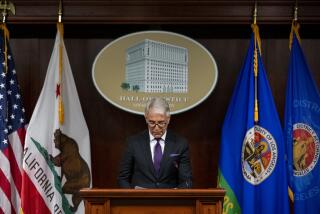Ex-Star Banker Faces Obstruction Charges
- Share via
NEW YORK -- Federal prosecutors filed an obstruction-of-justice complaint Wednesday against former Silicon Valley investment banking star Frank Quattrone, marking the first time that criminal charges have been lodged against a Wall Street figure in the industry’s current rash of scandals.
The three-count complaint alleges that Quattrone, the former Palo Alto-based head of technology investment banking at Credit Suisse First Boston, sought to impede government probes into the firm’s handling of initial public stock offerings.
According to the complaint, Quattrone sent an e-mail to fellow employees urging them to destroy IPO documents even though he knew that government probes were underway and that all records had to be preserved. CSFB employees responded to his directive by destroying numerous documents that should have been turned over to investigators, the complaint said.
Prosecutors portrayed the case as sending an important message to corporate America. Government probes of corporate wrongdoing are dependent on executives complying with subpoenas and turning over all necessary documents, said James Comey, the U.S. attorney in Manhattan whose office filed the complaint.
“This is the kind of case that has to be brought,” Comey said. “We simply must enforce the honor system.”
Quattrone’s attorney, John Keker of San Francisco, said his client is innocent.
“Only prosecutors who see the world through dirty windows would take a one-sentence e-mail supporting company policy and try to turn it into a federal criminal case,” he said. “These accusations are wrong and unfair.”
Regulators have conducted high-profile civil probes of brokerage firms and some individuals as part of their investigation of excesses during the 1990s bull market. But this is the first criminal action lodged against someone on Wall Street as a result of those probes and it is expected to be watched closely.
Quattrone surrendered to the FBI at 8 a.m. Wednesday in New York, a Comey spokesman said. He appeared before U.S. Magistrate Judge Theodore Katz and was released on his own recognizance.
Quattrone, who was ordered to turn over his passport, could face a maximum of 25 years in prison if convicted. Katz set a preliminary hearing on May 13. The government has 20 days to file an indictment.
Quattrone, who was dressed in a gray suit with a blue shirt and red paisley tie, didn’t answer reporters’ questions. Amid a throng of TV cameras, his lawyers hustled Quattrone out of court, and he was driven away in a Dodge minivan.
A CSFB spokeswoman declined to comment.
Quattrone was the most powerful investment banker in Silcion Valley during the height of the 1990s’ technology craze. He is credited with anticipating the tech surge early on and establishing relationships with Silicon Valley executives far earlier than his Wall Street rivals.
Problems for the firm and Quattrone began in late 2000 when the Securities and Exchange Commission and the NASD, formerly the National Assn. of Securities Dealers, investigated the way CSFB doled out lucrative IPO shares. The firm later paid a $100-million fine to resolve the probes.
Comey’s office convened a grand jury at the time, but ended its investigation without bringing charges.
The issue seemed finished until a previously undisclosed crop of e-mails surfaced in January indicating that Quattrone was aware of the probes when he sent his e-mail urging co-workers to destroy documents.
In his Dec. 5, 2000, e-mail, Quattrone endorsed an e-mail sent the day before by one of his subordinates encouraging employees to “clean up” certain documents. Quattrone’s e-mail told employees that “I strongly advise you” to follow the suggestions in the Dec. 4 e-mail.
According to the complaint, Quattrone was told in June 2000 about the NASD investigation, and in September 2000 about the SEC probe. He was informed on Dec. 3 -- two days before sending his controversial e-mail -- about the grand jury investigation, according to the complaint.
CSFB suspended Quattrone in February after the e-mails came to light. He resigned from the firm under pressure last month.
Legal experts said that based on the single Dec. 5 e-mail, the government’s case appeared to be weak. However, they pointed out that prosecutors probably have additional evidence that they have not divulged.
“That e-mail, which obviously lends itself to an insidious implication, also lends itself to a number of innocent implications,” said George B. Newhouse Jr., a partner at Thelen Reid & Priest in Los Angeles.
But prosecutors may not have wanted to show their full hand.
“You don’t put all your evidence in the complaint if you don’t have to,” said Jeffrey Eglash, a partner at Howrey Simon Arnold & White in Los Angeles. “You don’t lay out a road map” to your strategy.
Ironically, Quattrone indicated that imprudent statements in e-mails can cause problems.
In encouraging employees to clean up their files, the CSFB employee who wrote the Dec. 4 e-mail noted, “Today, it’s administrative housekeeping. In January, it could be improper destruction of evidence.”
Quattrone immediately shot back: “You shouldn’t make jokes like that on e-mail.”
More to Read
Sign up for Essential California
The most important California stories and recommendations in your inbox every morning.
You may occasionally receive promotional content from the Los Angeles Times.













